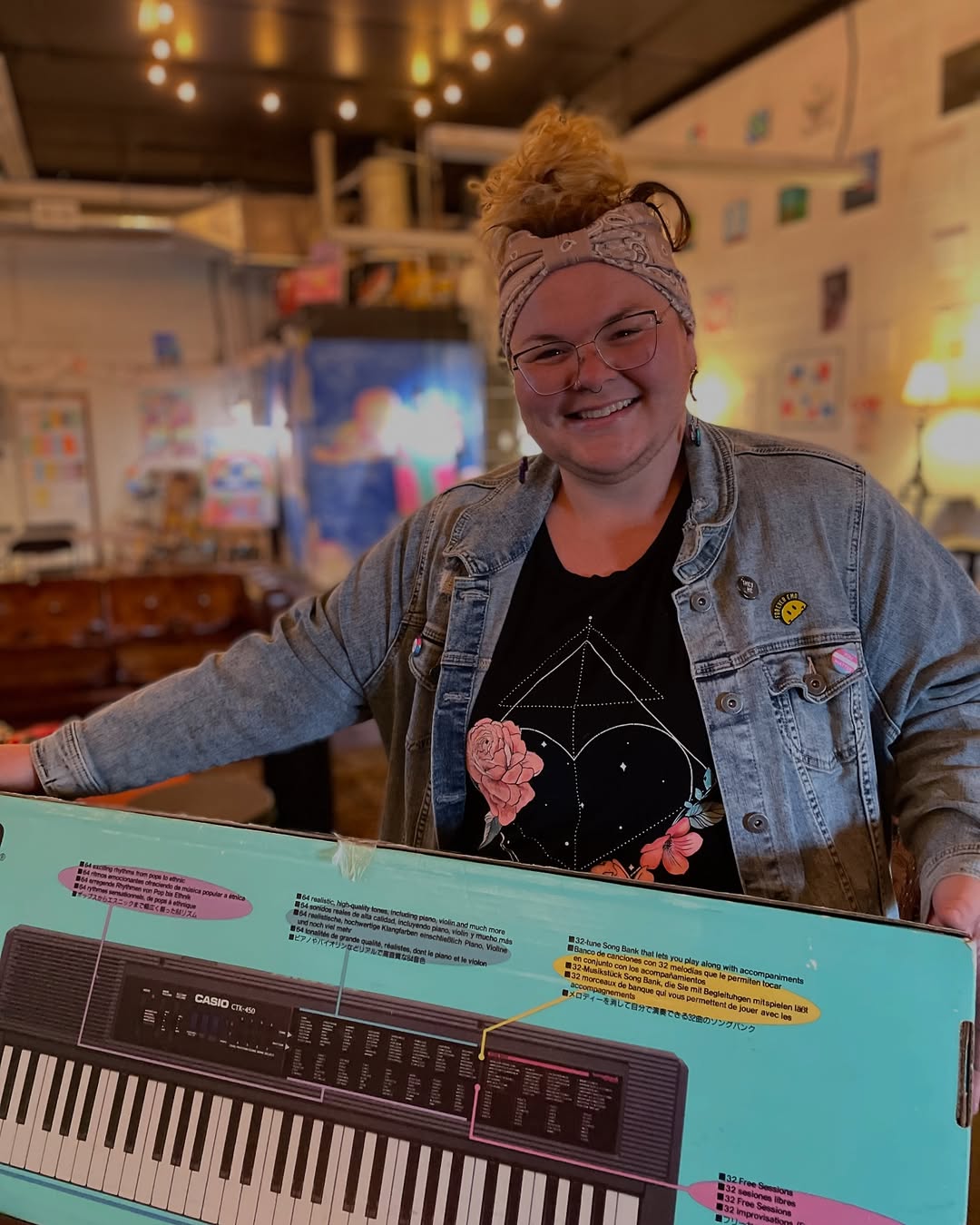When the final notes fade at Fit to Recover's creative jam nights, most participants head home, carrying only memories of the music they created together. But for Ray, those musical moments will now continue beyond the community space and into their daily life, thanks to a keyboard they can now call their own.
From Community Jams to Personal Practice
Ray's musical journey began, like many in recovery, in a supportive community setting. The creative jam nights at Fit to Recover provided a safe, substance-free environment where Ray could explore keyboard playing without judgment or pressure. These community sessions became an important touchpoint in Ray's recovery routine—a place to connect with others, express emotions, and experience the joy of creating music.
But musical growth doesn't happen in isolated weekly sessions alone. Real progress and the deepest therapeutic benefits come from regular engagement with an instrument. Until recently, Ray's keyboard playing was limited to these community gatherings, with no way to continue practicing and developing at home.
"The transition from playing only in community settings to having an instrument at home represents a significant milestone in recovery. It signals a commitment to incorporating music as a permanent part of one's healing journey, not just an occasional activity."
Through Rhythm in Recovery, Ray now has their own keyboard—a tool for continued musical growth, emotional expression, and recovery support that's available whenever needed, day or night.
Why Having an Instrument at Home Matters
While community music sessions provide invaluable connection and structure, having an instrument at home creates an entirely different dimension of support for someone in recovery. The availability of a keyboard in Ray's personal space opens up numerous benefits that complement their ongoing recovery journey:
Benefits of Home Instrument Access in Recovery:
Consistent coping mechanism: During challenging moments—when cravings, anxiety, or difficult emotions arise—Ray now has immediate access to a healthy coping tool
Daily practice routine: Establishing regular practice creates structure and discipline that supports overall recovery
Private exploration: The freedom to try new things, make mistakes, and experiment without an audience builds confidence
Skill development: More frequent practice accelerates learning, creating a sense of accomplishment and progress
Emotional processing: Music provides a non-verbal outlet for processing complex emotions that might arise between therapy or group sessions
Identity reinforcement: Having an instrument at home strengthens identification as "a person who plays music," supporting positive identity reconstruction in recovery
The Keyboard: A Versatile Recovery Tool
Of all the instruments someone in recovery might play, keyboards offer unique advantages that make them particularly valuable as recovery tools. For Ray, the keyboard provides:
Immediate satisfaction: Unlike some instruments that require significant technique before producing pleasing sounds, keyboards can create beautiful music from day one
Versatility: From gentle, meditative sounds to energetic rhythms, keyboards can express the full spectrum of emotions
Self-contained experience: With headphones, Ray can play anytime without disturbing others, making music accessible even in shared living situations
Visual learning: The linear arrangement of keys provides visual feedback that can be helpful for beginners
Progressive challenge: From simple one-finger melodies to complex compositions, keyboards grow with the player's abilities
At Rhythm in Recovery, we believe that matching the right instrument to each individual is crucial. For Ray, the keyboard represents not just any instrument, but one that connects to their existing experience at jam nights and fits their specific recovery needs and living situation.
Starting a Home Practice: Tips for Success
As Ray begins their home keyboard journey, establishing effective practice habits will help maximize both musical progress and recovery benefits. Here are some strategies that work well for individuals incorporating music into their recovery routine:
Start Small, Stay Consistent
Even 10-15 minutes of daily practice is more beneficial than occasional longer sessions. Consistency builds neural pathways that support both musical skill and recovery.
Create a Dedicated Space
Setting up a designated area for the keyboard helps establish a ritual around practice and signals to the brain that it's time for focused musical engagement.
Connect with Emotions
Try playing music that matches your current emotional state, then gradually shift to music that expresses how you'd like to feel. This musical emotional regulation is powerful.
Balance Structure and Exploration
Alternate between working on specific skills or songs and simply exploring the keyboard without judgment or expectations.
A Continuous Symphony of Support
Ray's new keyboard represents more than just an instrument—it's a symbol of continuity in their recovery journey. The music that began in community sessions at Fit to Recover now extends into their daily life, creating a thread of creative expression that weaves through all aspects of their recovery.
We at Rhythm in Recovery are honored to play a small part in Ray's ongoing journey. By providing the keyboard, we've helped create a bridge between community music-making and personal practice, expanding the role music can play in supporting Ray's wellbeing.
As Ray continues to develop their keyboard skills at home, they're not just learning music—they're strengthening recovery skills like patience, persistence, self-compassion, and healthy emotional expression. Each practice session becomes a mini-victory in the larger journey of recovery.
Keep up the great work, Ray! We can't wait to hear how your musical journey unfolds.
Support Musical Journeys in Recovery
Rhythm in Recovery provides musical instruments to people in recovery from mental health and substance abuse issues. If you or someone you know is in recovery and without an instrument, we want to hear from you.
Similarly, if you have instruments to donate or wish to support our mission financially, please reach out. As a registered 501(c)(3) nonprofit organization, all donations are tax-deductible.
Together, we can ensure that more people like Ray have the opportunity to experience the healing power of music in their recovery journey.


